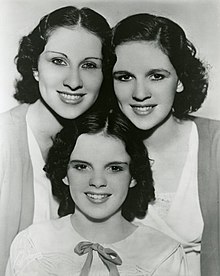Francis Avent Gumm
Francis Avent Gumm | |
|---|---|
 Gumm circa 1920s | |
| Born | March 20, 1886 Murfreesboro, Tennessee, US |
| Died | November 17, 1935 (aged 49) Los Angeles, California, US |
| Burial place | Forest Lawn Memorial Park (Hollywood Hills) |
| Other names | Frank Gumm |
| Occupations |
|
| Spouse | |
| Children | 3, including Judy Garland |
Francis "Frank" Avent Gumm (March 20, 1886 – November 17, 1935) was an American vaudevillian and theatre manager. He is the father of the American actress, singer, and vaudevillian Judy Garland.
Early life
[edit]Gumm was born on March 20, 1886, in Murfreesboro, Tennessee, United States.[1] He was the son of Clemmie (née Baugh) and William T. Gumm.[1][2] After Gumm's mother died in 1895, his family faced poverty. His godfather, the millionaire George M. Darrow, discovered that Gumm was an exceptional vocalist and helped the boy earn a choral scholarship for college.[2]
Gumm attended Swannee Military Academy, followed by six years at the University of the South.[1][2] He left college in 1904 to attend to his brother and sister in Murfreesboro; his father died in 1906.[2] Gumm worked as a court reporter and stenographer by day and at his uncle Walter D. Fox's theater in the evenings.[2] Gumm, his siblings, and uncle moved to Tullahoma, Tennessee around 1909 where his uncle ran a Knights of Pythias home for orphans and widows.[2]
Career
[edit]
Starting in 1910, Gumm toured in vaudeville as a tenor singer.[1] He met his wife, Ethel Marion Milne, in Superior, Minnesota.[2] She shared his passion for the performing arts and often served as the pianist during performances, while Gumm managed the logistics and bookings. In the 1914, they moved to Grand Rapids, Minnesota, where Gumm owned and operated the New Grand Theatre.[3][4] The theatre showcased a variety of acts, including vaudeville performances, silent films, and live music, helping to foster a local arts scene. It was also where his daughters began their performing careers as a vaudeville group The Gumm Sisters. Their early acts often featured a mix of singing, dancing, and harmonizing, with Ethel accompanying them on the piano.[5]
In 1926, the family moved to Lancaster, California, near Hollywood, seeking better opportunities for the daughters' careers.[4][3] The Gumm Sisters continued to perform in vaudeville and appeared in several short films. However, the entertainment industry was becoming more competitive and the family struggled to establish a significant foothold.
Despite the difficulties, Frank continued to manage his daughters’ careers. By the mid-1930s, his daughter Judy began to emerge as the group's standout talent, drawing attention from talent scouts. Gumm called his theater in Lomita, California Garland's Lomita Theatre.[1] In 1935, she signed a contract with Metro-Goldwyn-Mayer (MGM), marking the beginning of her rise to stardom.
Personal life
[edit]Gumm met his wife Ethel Marion Milne in the vaudeville industry where she was an actress, singer, and pianist.[4] He married Milne on January 11, 1914, in Michigan.[6] The couple had three children: Mary Jane Gumm (born 1915), Dorothy Virginia Gumm (born 1917), and Frances Ethel Gumm (born 1922). The latter is better known as Judy Garland.
Despite a shared commitment to their daughters’ early careers, the Gumm's marriage reportedly faced tension, partly due to financial pressures and personal struggles. Some biographies and historical accounts indicate that Gumm may been bisexual and had relationships with men, which contributed to strain in his marriage and led to difficulties within the family.[7][2] Although aspects of his personal life were challenging, Gumm remained committed to supporting his daughters, especially young Frances, in their performances.[citation needed]
Gumm died from spinal meningitis on November 17, 1935, in Cedars of Lebanon Hospital in Los Angeles, California, at the age of 49.[3][1] He was buried in Forest Lawn Memorial Park.[8]
Gumm's legacy is closely tied to the early stages of Judy Garland's career, paving the way for Judy Garland's future success. Although he did not live to see his youngest daughter become one of the most iconic figures in entertainment history, his contributions during her formative years were instrumental.[9]
References
[edit]- ^ a b c d e f "Former Resident Succumbs in West". The Daily News-Journal. Murfreesboro, Tennessee. 1935-11-19. p. 1. Retrieved 2024-12-06 – via Newspapers.com.
- ^ a b c d e f g h Wise, Mike (September 20, 2009). "Millionaire couple helped save Judy Garland's dad –". Rutherford County Tennessee Historical Society. The Murfreesboro Post. Retrieved 2024-12-06.
- ^ a b c "Obituary for Frank Gumm". The Duluth News Tribune. 1935-11-20. p. 13. Retrieved 2024-12-06 – via Newspapers.com.
- ^ a b c Dison, Brad (2020-11-25). "Baby Gumm". Natchitoches Parish Journal. Retrieved 2024-12-06.
- ^ Fricke, John (18 July 1994). Judy Garland: A Portrait in Art & Anecdote. Bulfinch. ISBN 978-0821228364.
- ^ "Francis "Frank" Avent Gumm (1886—1935)". FamilySearch.
- ^ Lehmann-Haupt, Christopher (March 12, 1975). "A Cult Object and a Martyr" (PDF). The New York Times. p. 37. Retrieved December 6, 2024.
- ^ "Theater Operator's Final Service Held". Los Angeles Evening Citizen News. 1935-11-21. p. 13. Retrieved 2024-12-06 – via Newspapers.com.
- ^ Edwards, Anne (1975). Judy Garland: A Biography. Simon & Schuster. ISBN 9780094610002.
